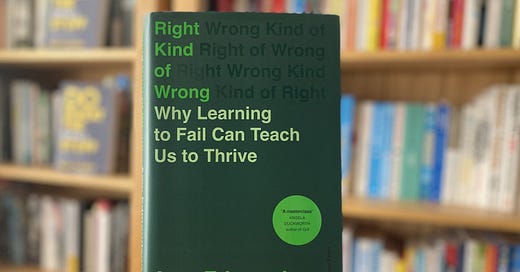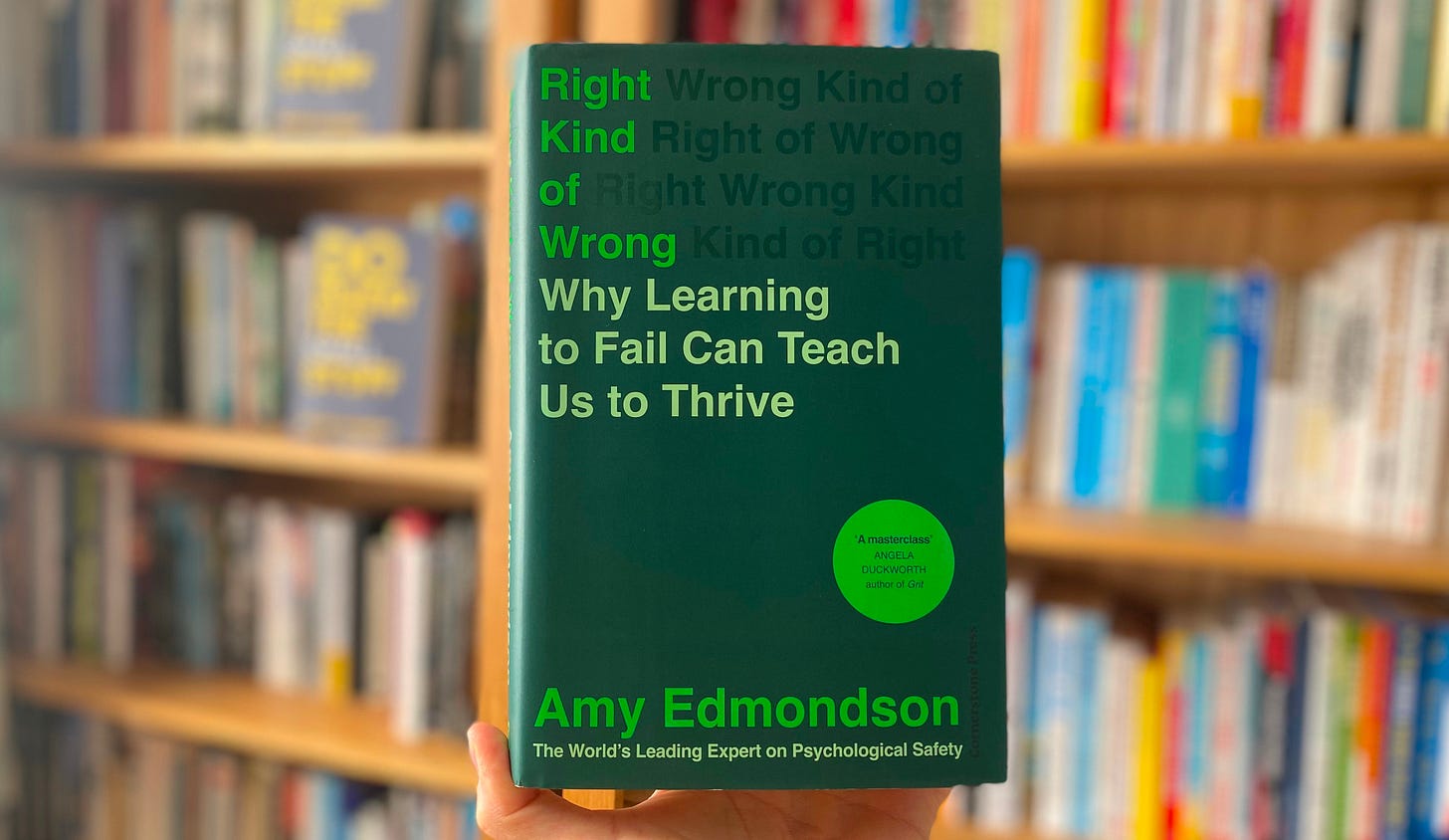The Right Kind of Wrong
This book by Amy Edmondson might just help you fundamentally reframe your relationships to failure, and get out there taking action
It can feel hard to escape the somewhat trite exhortation to “fail fast, learn fast” or the reminder of “failure being a stepping stone to greatness”. Understanding the necessity and inevitability of failure on an intellectual level is one thing, but embracing failure is much harder emotionally. This book acknowledges the fear and aversion that most of us feel, and then actually breaks down how to fail well. This is both in terms of how to identify failures that are worth pursuing (and those that we should do our best to avoid) alongside practical, helpful (non-condescending) ways to handle the emotional impact and reframe our perceptions.
What’s it all about then?
Failure! You want more than that? OK, go on then.
Edmondson beings by laying out the failure landscape, looking at the many reasons we resist failure, both within ourselves (aversion, confusion and fear), interpersonally (stigma and fear or rejection) and in our organisational settings, related to how failure is perceived and responded to within our organisations and the level of psychological safety present.
She then lays out the crux of the book, the three types of failure:
Basic failures
Where a mistake occurs because we fail to use knowledge which already exists about how to achieve a desired result.
Complex failures
Where multiple factors interact in an unexpected way to cause failure, despite being within a familiar setting.
Intelligent failures
Where failures take place in new territory, where the context presents a credible opportunity to advance towards a desired goal, where it is informed by available knowledge and where the failure is as small as it can be to still provide valuable insights.
In each case, Edmondson provides stories to illustrate and frameworks for how to recognise that type of failure, and then suggestions of what to do with them. For the first two, it is about how to prevent, avoid and reduce them, and in particular for complex failures, it is about how to spot warning signs, systems and situations that are susceptible, and then how to catch and correct before the consequences become significant.
Intelligent failures however, are, for Edmondson, the right kind of wrong. In those cases what matters is how to identify, embrace and learn from them, and be willing to create them through iteration and experimentation.

The second half of the book is about practicing the science of failing well. Here Edmondson describes how we are wired to avoid failure, and how to do some rewiring; acknowledging the intersection of what we think and how we feel, and providing ways to reframe how we perceive ourselves and the failure itself. She also explores the impact of context - consistent, variable and novel - and does a brief dive into systems, both for their potential to create and mitigate against the types of failure we might wish to avoid.
Edmondson concludes with her thoughts on how to thrive as a Fallible Human Being (FHB), both how we embrace and make peace with our own fallibility and how we can create a healthy failure culture.
What are the highlights?
This book is packed with them, but the chapter “We Have Met the Enemy” really spoke to me. Looking at the key skill of shifting our perspective of and response to failing, it left me feeling powerfully acknowledged for the very real fear and avoidance that we all have around failure, yet also compassionately invited me in to reframe that and drive out the shame. It’s the chapter that most inspired me to put the book down and go and take action, to play to win rather than play not to lose, to go and do the thing I want to do but have been avoiding so hard. And to be clear, this is not simply about writing that inspires, though it was that to me. The book also offers practical tools, in reframing and pivoting, and self-reflection questions that helped me get to the root of what I was avoiding.
“Pause to challenge the automatic thoughts that cause you pain and embarrassment. Next, reframe those thoughts to allow you to choose learning over knowing. To look outward and find energy and joy from seeing what you missed. At the core of the reframing task lie the words we use to express our thoughts, privately and aloud. Am I failing, or am I discovering something new? Do I believe I should have done better –and I’m bad for not having done so – or do I accept what happened and learn as much as I can from it? Am I okay with the discomfort that comes with new experiences? Will I give myself permission to be human? Permission to learn?”
Anything you didn’t like?
Edmondson lost me a little in the chapter on systems. There seemed to be a lot of introduction to systems thinking which felt unnecessary, and it took a long time to get to the main points.
There are reflection questions throughout the book – I’d have liked to see these included in a more structured way, and perhaps some companion resources that draw them together to make them more user friendly as tools to use day-to-day.
Why should I read it?
If you resist or avoid failing, yet have a nagging sense that there’s more possible for you if you could do it a bit more often, this book may just help. Equally if you’re aware you tend to play not to lose, but really fancy being the sort of person who plays to win, you may find the inspiration – and the practical support – to start doing just that.
What’s the one thing you’ll do differently as a result of reading this?
I’ve been talking for a looooooooong time about running some free workshops based around the ideas in my book - how to harness the power of our micro-interactions and micro-behaviours. Up to now, I’ve studiously avoided actually setting a date and talking about it, with that very real fear that no one will sign up, or perhaps worse, only one person will show and it’ll be completely excruciating!!
But…..it’s happening. Next Wednesday to be precise. Join me if you can, details below.
Right Kind of Wrong: Why Learning to Fail Can Teach Us to Thrive.
FT Business Book of the Year 2023.
By Amy Edmondson. Published by Cornerstone Press, 7 September 2023.
Available at Amazon UK, Amazon US, or Bookshop.org. (#aff links)
Unlock the hidden power of small, everyday interactions with "Small Stuff, Big Impact" – this live, online (and complimentary) workshop will introduce you to the world of micro-interactions – those small, seemingly inconsequantial moments that have a profound impact on your team’s engagement and performance. If you’re leading or managing others, mastering these moments is essential to building stronger relationships and creating a more motivated, connected team.
In this 60-minute introductory workshop, you will:
🌟 Learn what micro-interactions are and why they matter in leadership.
🌟 Discover how small adjustments in communication, tone, and behaviour can create a ripple effect, transforming your daily interactions into powerful tools for engagement.
🌟 Learn how to translate theory into action – you will leave with a framework to think through your micro-interactions and practical suggestions to start making subtle but effective changes right away.
Register for your place via this link: https://bit.ly/3AXQg4u
Places are limited to ensure a truly interactive discussion, so sign up now to avoid missing out.
FAQs:
❓ What does it cost to join? Nothing! This workshop is free to join.
❓ When and where is it? Wednesday 25th September, 12:30-13:30 BST on Zoom, as a live meeting (not a webinar).
❓ Will I get a copy of the materials? Yes, these will be emailed to you afterwards. You’ll also have access to a short email course to help you put the concepts into practice, and a 30% discount code for my book.
❓ Will it be recorded? No, to make it interactive we need real, live humans attending...
❓ What if I can’t make this time? DM or email me at sarah@sarahlangslowcoaching.com to be added to the waiting list and get priority access for the next time this is run.
See you there!
If you’re not already a subscriber to Small Stuff Big Impact, click here to have it delivered to your inbox:
Have you read Right Kind of Wrong? I’d love to hear what you thought, so click here to add a comment or your own review:
And if you know someone else who might enjoy this, click here to send it to them directly:
Thank you!





